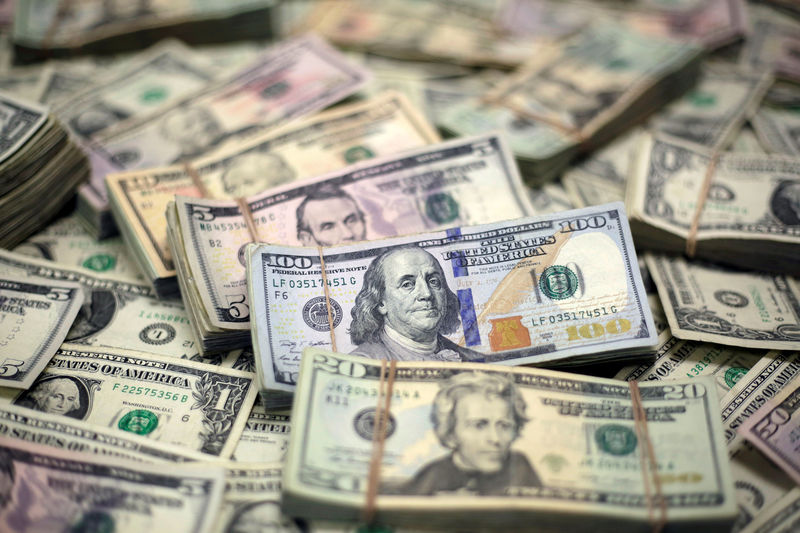By Shinichi Saoshiro
TOKYO (Reuters) - The dollar rose to a 13-month high against a basket of currencies on Friday and the yen also made big strides, with investor appetite for risk dropping amid escalating global trade tensions and diplomatic wrangling.
The euro fell to its weakest since July 2017, while the pound dropped to its lowest in a year amid speculation Britain will leave the European Union without an agreement regarding its future relationship with Brussels.
The dollar index (DXY), which measures the greenback's strength against a group of six major currencies, climbed more than 0.6 percent to 96.103, its highest since July 2017.
The greenback has been boosted by growing global trade tensions and strained geopolitical relationships, with the United States this week saying it would impose fresh sanctions on Moscow. Washington is also embroiled in a diplomatic feud with Turkey.
Russia would consider it an economic war if the United States imposed a ban on banks or a particular currency, Prime Minister Dmitry Medvedev said on Friday, the TASS state news agency said.
"There are all sorts of uncertainties and concerns in the markets currently, with the U.S.-China spat a well established one, but concerns over the European Union, Britain and Turkey also in the air," said Bart Wakabayashi, branch manager for State Street Bank and Trust in Tokyo.
"And amidst all this, the yen is suddenly back in vogue as a safe-haven. The dollar and yen are serving as safe-havens at the same time."
With the dollar seen to be absorbing safe-haven flows, the yen's gains against the greenback were limited. The Japanese currency, however, rallied against other peers such as the euro, pound and Australian dollar.
The euro was down 0.75 percent at 127.13 yen (EURJPY=), the pound lost 0.25 percent to 142.03 yen (GBPJPY=) and the Aussie shed 0.85 percent to 81.29 yen (AUDJPY=).
The Turkish lira
"Even in the unlikely event that Turkey resolves its diplomatic row with the United States, downside concerns towards the lira won't ease," said Takahiko Sasaki, market economist at Mizuho Bank.
Turkey is saddled with a mountain of short-term external debt, a high current account deficit and accelerating inflation, Sasaki said.
Meanwhile, the pound has slumped 1.55 percent this week amid worries about a so-called 'hard' Brexit.
Sterling fell roughly 0.2 percent $1.2830
The euro dropped 0.6 percent to $1.1438 (EUR=), its weakest since July 2017.
The single currency had already suffered deep losses overnight, its decline accelerating after the European Central Bank said that risks to global growth are increasing as the risk of protectionism and the threat of higher U.S. tariffs sap confidence.
The euro was down almost 1 percent for the week, dogged by renewed investor concerns that Italy was heading for a costly and unsustainable spending spree.
The dollar dipped 0.1 percent to 110.98 yen
The U.S. consumer price inflation (CPI) report for July is expected to show inflation likely increased 0.2 percent, after rising 0.1 percent in June.
The United States and Japan on Thursday began what the two sides call "free, fair and reciprocal" negotiations on trade, with the discussions due to continue on Friday.
ROUBLE WOES
The rouble
The Chinese yuan weakened about 0.55 percent to 6.855 against the dollar in spot trading
The yuan has slipped about 0.4 percent this week, weighed down as the market remained bearish on the near-term outlook for the currency amid the trade war between Washington and Beijing.
Elsewhere, the New Zealand dollar remained on the back foot, stretching its overnight slide to $0.6586

The kiwi lost 2 percent on Thursday after the Reserve Bank of New Zealand surprised the market by committing to holding rates at record lows until the end of 2020.